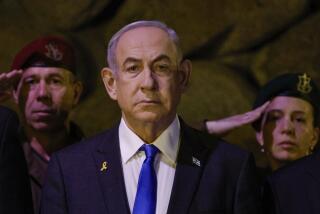U.S. Vetoes Arafat Protection
- Share via
UNITED NATIONS — The United States vetoed a resolution Tuesday that demanded that Israel not deport or threaten Palestinian leader Yasser Arafat, calling it flawed because it did not specifically condemn Palestinian terrorism.
Eleven U.N. Security Council members voted in favor of the Arab-backed measure seeking the world body’s help to protect Arafat, after the Israeli security Cabinet declared last week that it would “remove” the leader of the Palestinian Authority because he was “an obstacle to peace.” Britain, Bulgaria and Germany abstained but strongly emphasized that they did not support Arafat’s removal.
After the vote, U.S. Ambassador John D. Negroponte cautioned Israel not to misinterpret the veto as support for exiling or harming Arafat. Negroponte urged both sides to return to negotiations on a U.S.-backed peace plan, which calls for the creation of a Palestinian state by 2005.
On Monday, the U.S. warned that it would block any measure that did not take a “balanced” approach, including condemning Palestinian militant groups -- Hamas, Islamic Jihad and the Al Aqsa Martyrs Brigade -- that Washington accuses of undermining the peace process.
“This resolution did not take a clear stand against the actions of these terrorist groups or call for decisive action against them,” Negroponte said in explaining the veto.
The Security Council postponed the vote Monday to try to come up with a text acceptable to all, but after a day of proposals and counterproposals, no accord was reached.
Syrian envoy Fayssal Mekdad, one of the resolution’s sponsors, said it was “highly balanced” and carefully drafted using previous measures that had been approved by the council. It also condemned suicide bombings and, by implication though not by name, the Palestinian groups that have claimed responsibility. That is a step further than earlier Arab-backed resolutions have gone.
Mekdad warned that the U.S. veto could cause a backlash in the Arab world at a time when Washington is trying to win support there for its efforts to rebuild Iraq.
“There won’t be a positive response from the people in the region,” he said after the vote. “This will only antagonize the feelings of the Arabs and increase their anger. We don’t think that the United States needs this anger after all that has happened in the region.”
Israeli Ambassador Dan Gillerman said he was pleased the “lopsided, biased” resolution did not pass. When asked if Israel would exile -- or even assassinate -- Arafat, he replied, “Israel will do what is necessary to protect its people.”
The veto reflects the politics of the peace process in the Middle East. Though the U.N. is seen by many as pro-Palestinian, the U.S. often acts as Israel’s protector on the council.
Since Negroponte arrived as the U.S. ambassador in September 2001, he has enunciated several principles that any resolution on the Israeli-Palestinian conflict must contain to win U.S. support: It must condemn terrorism and incitement along with the groups that support terrorism, it must demand the dismantling of terrorist infrastructure and it must contain a commitment by both parties to negotiate a settlement. Also, Israel must withdraw to positions it occupied before September 2000.
But Arab diplomats have traditionally disagreed with the characterization of the Palestinian militant groups’ actions as terrorism, meaning the Security Council will not be a forum for forging Middle East peace unless one side radically changes its stance.
Several envoys worried that Tuesday’s veto might actually fan the flames of the conflict.
“We are in a worse situation than we were in before,” said Bulgarian ambassador Stefan Tavrov, who abstained. “It is worse to have a failed resolution than to have no resolution.”
More to Read
Sign up for Essential California
The most important California stories and recommendations in your inbox every morning.
You may occasionally receive promotional content from the Los Angeles Times.










